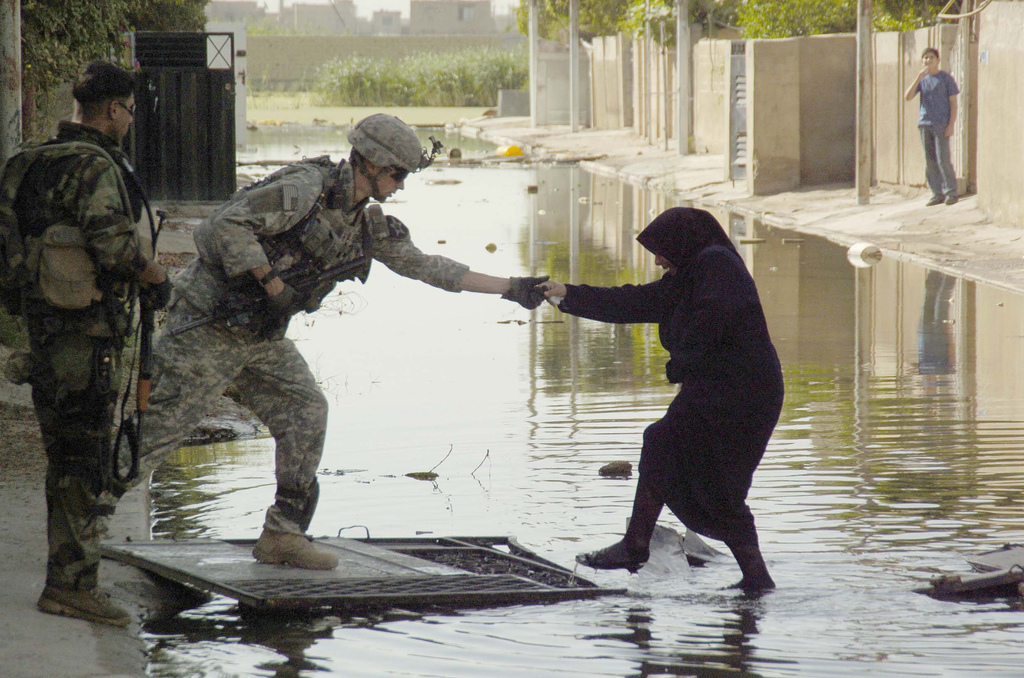
Sisters in War: A Story of Love, Family, and Survival in the New Iraq
by Christina Asquith
–Reviewed by Saskia Vogel
 Sisters in War reads like a serial drama, kicking off with the fall of Saddam Hussein in a time of naïve hope. Christina Asquith’s breezy style still captures the complexities of the 2003 invasion and its aftermath, particularly how one can be anti-Republican, think that war always has an especially negative impact on women, and still see the good in clearing the way for a new Iraq.
Sisters in War reads like a serial drama, kicking off with the fall of Saddam Hussein in a time of naïve hope. Christina Asquith’s breezy style still captures the complexities of the 2003 invasion and its aftermath, particularly how one can be anti-Republican, think that war always has an especially negative impact on women, and still see the good in clearing the way for a new Iraq.
Asquith closely follows three women who represent different political perspectives. Zia is a recent university graduate and the go-getting daughter of a progressive Baghdad family with hopes for free speech and equality post-Saddam. Her family is supportive of her public career with the American-run Iraqi Media Network, even when her professional and romantic alliances with the occupiers put their lives in danger.
Lieutenant A. Heather Coyne works to help Iraqi women join public life but finds herself hindered by military bureaucracy. Aggravated by the casual sexist remarks and ass-slapping she endures in the military, her commitment to empowering women grows. Though untrained in aid work and lacking any real knowledge of Iraqi culture, Heather charged with distributing a large government grant to establish Baghdad’s first women’s center.
Heather seeks the help of Manal Omar, an Iraqi-American NGO worker who has ingratiated herself with Baghdad’s locals. Manal, who chose to take the veil to her Iraqi mother’s dismay, makes slow progress in her mission to encourage women to drive their humanitarian agenda: the needs of women across the spectrum of Islam seem irreconcilable, and women’s rights workers are targets of violence. Understanding that they need each other, Heather and Manal set aside the usual rift between U.S. military and aid workers.
As part of Asquith’s intimate tableau, the personal impact of events such as the decapitation of American businessman Nick Berg by Islamic extremists, the drafting of a constitution, and the invasion itself hit in the gut. Vibrant peripheral characters – an uncompromising American aid worker, the contractors who find it easier to be in a war zone than to deal with problems at home, and Zia’s string of unlikely Iraqi suitors – flesh out the experience of life for women in Iraq until 2009.
But it’s Zia’s quiet younger sister who makes the biggest impression. Like all the true victories in this book, hers is personal, not political. Nunu’s story of self-realization is a tender one – from her excitement at the arrival of the Americans (and the girlish dream of being swept away by a soldier) to falling into deep depression after uncontrolled violence against women on the streets forces her to stay indoors. She sits uncomfortably between admiring her sister’s independence and wanting a traditional feminine role. With the help of a newly-aired TV show called Oprah, she becomes her own mistress.
Asquith challenges stereotypes by showing how Americans and Iraqis perceive each other and why. As time passes, the warmly welcomed American liberators are viewed with increasing suspicion. With a 70% unemployment rate and political tensions high, Islamic extremism and conservatism grow more prominent in Iraqi civic life. In turn, the U.S. occupiers treat all Iraqis as potentially violent and untrustworthy. Lost in the mire is the generation of Iraqis, like Zia’s parents, that embraced Western attitudes before the 1963 rise of the Ba’ath party and hoped to participate in the culture again.
In this political and social maelstrom, Asquith finds the silver lining in small triumphs of feminism.
Excerpt: “Zia knew there was no more striking symbol of the ultimate conquest than for invaders to have sex with Islamic women – and if the woman does so willingly, there is no greater betrayal.
She’s a dead woman, Zia thought horrified.
“But Mama, everything is different now,” Zia said, her voice rising. The Americans were bringing a whole new kind of society to Iraq- full of freedom and opportunity like nothing she and her sister had seen before. She wanted to be a part of making that happen. She just had to get the job, and she couldn’t bear to wait while things were changing out there, without her.
For Nunu’s depression, they gave her small white tablets. Now she slept even more, and she couldn’t even get up from the bed. Nunu turned her anger and frustration inward. She wondered if the Islamists were right? I am a weak girl, she thought. I am unimportant and stupid. Her journal entries grew darker and darker.”
Further Reading: Tears of the Desert: A Memoir of Survival in Darfur and The Emergency Teacher: The Inspirational Story of a New Teacher in an Inner City School
Saskia Vogel writes a lot. She also edits magazines. Visit her at http://Saskiavogel.com.
*Photo courtesy The U.S. Army.




Send A Letter To the Editors